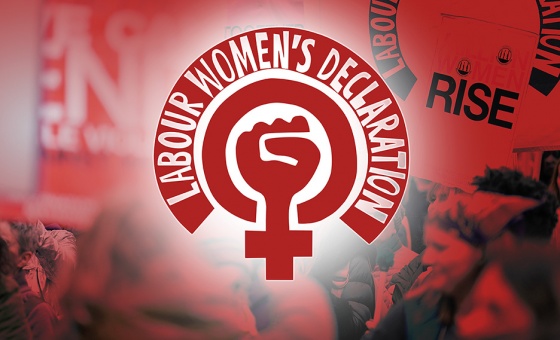This is the last article you can read this month
You can read more article this month
You can read more articles this month
Sorry your limit is up for this month
Reset on:
Please help support the Morning Star by subscribing here
HUNDREDS tuned in to watch the Morning Star’s fringe meeting at Labour Connected on breaking the big business stranglehold on the media at the weekend, with thousands more viewing the livestream online.
MPs, campaigners and journalists discussed how we can “democratise the media and get our message of socialist change across,” in the words of Claudia Webbe MP.
Webbe noted that “a strong, diverse and independent media is a cornerstone of a healthy society — but much of our press isn’t free at all.”
She cited a 2019 media report showing that just three firms — News UK, the Mail Group and Reach — own 83 per cent of newspapers, up from 71 per cent in 2015, “showing that monopolisation is continuing.”
Online, five companies — those three plus the Guardian and Telegraph — controlled 80 per cent of the market, just five companies own 80 per cent of local titles and just two owned 46 per cent of all commercial local analog radio stations and two-thirds of all digital stations, she said.
“Monopolisation is bad for democracy,” she warned. “The increasing concentration of media ownership allows the few to amass ever vaster social, economic and political power.”
Webbe, who has a fortnightly Morning Star column, called on more Labour MPs to contribute to the only socialist daily.
People’s Assembly national secretary and former Labour MP Laura Pidcock said the experience of the past five years showed that anyone proposing fundamental economic change would “not see their vision represented” in mainstream media.
“The daily realities of working people are very rarely reflected,” she said, recalling an appearance she made on Politics Live when a shadow minister just after the UN’s special rapporteur on extreme poverty Philip Alston published a devastating report on poverty in Britain.
“I was sat with my political adviser saying surely this will come up, they’ll ask about the ramifications for the government” of a UN report stating that 14 million people lived in poverty.
“But after nearly an hour of the show there was no mention of that report. It took what some might have thought a rude interjection from me to say: ‘Why aren’t you talking about this?’
“This was not just a few people living in awful conditions but millions.”
Yet endemic poverty pay, the devaluation of labour and the “harsh employment terrain people were having to navigate” did not figure as news in the eyes of the programme, which was fixated on internal Tory Party machinations.
The cumulative effect on working-class people of never seeing their experiences reported is “an isolating and atomising one in which you are lulled into thinking your fears, your circumstances and your hardship is about your lack of capacity rather than a systemic experience of suffering in a capitalist system,” she observed, saluting the Morning Star for its role as an “uncompromising” alternative that prioritised working-class voices.
And she said social media was no panacea, noting that “we don’t own the algorithms, we don’t own the platforms.”
Former Labour leader Jeremy Corbyn told the meeting that it was essential the Morning Star survived as a “voice for the left, a paper dedicated to redistributing power and wealth and giving a voice to working-class people and working-class organisations.”
He said he was “very happy to buy the Morning Star in the local Co-op and very pleased the Co-op always seems to stock it” but called for pressure on other retailers to do so.
The demonisation of his own leadership was because of policies, he said, but pointed out that the media were mostly determined to avoid talking about them.
When he had revealed during an election debate with Boris Johnson “an absolutely accurate document” exposing that Britain had been secretly negotiating with the US Trade Department for two years over giving US companies access to public services, especially the NHS, “did the media say ‘Corbyn’s onto something, this is an issue that’s got to be addressed?’
“No, they decided that somehow or other the documents had been given to me by the Russians.
“I was very puzzled by this. I met no Russians. I spoke to no Russians. I speak no Russian,” he noted wryly.
“And I couldn’t imagine what interest the Russians might have in a Tory plot to hand our NHS to American companies.”
But of course, the point of the media attack was “to divert attention from the issue and insinuate that I was a dishonest and unreliable person.
“Well — our NHS is under threat. It will be as long as there are people in Parliament willing to go along with the idea of privatising public services.”
Corbyn also took a swipe at “those people now being paid a great deal of money to write books analysing the past five years,” saying the books focused on “tittle tattle — gossip” like “who said what to who, who got the coffee for who where, who paid for the hotel” rather than the politics of Labour’s left turn.
“The people who have written those books — and they know very well who they are — have completely failed to address the real issue which is the power structures in our society and the way in which the very powerful and very wealthy teamed up with the most powerful and well resourced media to attack the Labour Party and the individuals within it,” he said.
Scotland’s Labour leader Richard Leonard said the failure of recent attacks on his own leadership showed the “strength of feeling in the party and movement on sticking to a radical political and economic agenda” and called for a left media that would back the fight for “our values of solidarity, interdependency and uniting communities” in the face of rising nationalism and racism.
Unite assistant general secretary Howard Beckett emphasised too that the attacks came over left-wing policy, but warned against Labour adopting the tactics of Tony Blair and Gordon Brown, who avoided mentioning policies in order to avoid being attacked in the press.
He said the left should never be frightened to talk policy, and backed the idea of a live YouTube channel operated by Unite.
Journalist and election strategist Steve Howell agreed that the promotion of our own left platforms was key when the mainstream media deployed various tactics to undermine the left.
Attacks and smears were one, he said, arguing that the demonisation of Corbyn had been more extreme even than the character assassination visited in earlier times on Arthur Scargill and Tony Benn.
Another was the framing trick Corbyn had mentioned with regard to the NHS trade talks, where the media turned the story into one about how the papers had been exposed rather than the substance of what they said.
But the third was simple — “blackout. We came up against this in comms when Jeremy was leader,” he said.
“You’d have people saying ‘why is Jeremy not doing any policy initiatives?’ — he was, but the media wasn’t covering them.”
A current example was the trial of Julian Assange, Howell pointed out, with Pentagon Papers publisher Daniel Ellsberg giving evidence last week.
With Ellsberg having been charged under the Espionage Act for exposing the lies of successive presidents over Vietnam, then being acquitted at the height of Watergate, “you might think that Ellsberg in London appearing in a historic trial like this was newsworthy. Actually apart from the Morning Star and one report in the Guardian, as far as I can see there has been a complete media boycott.”
The Assange case saw “journalism on trial,” he said, and quoted Ellsberg: “Everybody has a stake in Assange’s trial. If Julian is extradited, no journalist in the world is safe from life imprisonment in the United States.”
Howell also warned of the dangers of increased regulation of social media, arguing that newspapers — which are not subject to state regulation — “are campaigning for regulation of social media not to safeguard from abuse, but in order to control and limit the debate.
“They see the threat of people like ourselves speaking directly to large numbers of people,” he argued, saying it was “hugely problematic” that the current Labour Party position was to support further regulation.
The Morning Star’s Labour fringe meeting is available to watch at mstar.link/MStarFringe2020.









